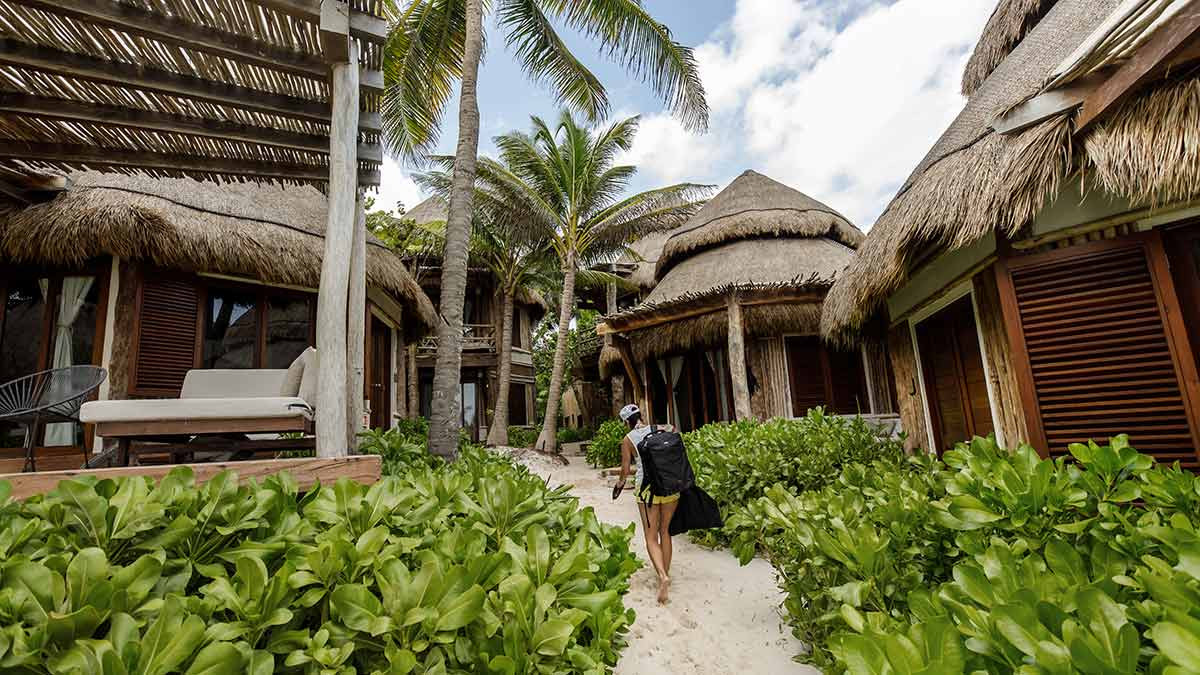Greenwashing Tourism is a prevalent issue, misleading travelers about sustainability efforts in Vietnam and beyond. SIXT.VN helps you navigate the eco-friendly travel landscape, ensuring your trip supports genuine sustainable practices. Learn to identify and avoid deceptive marketing while discovering truly responsible tourism options for unforgettable Vietnam travel experiences.
1. What is Greenwashing in Tourism and Why Should I Care?
Greenwashing occurs when a tourism company or destination deceptively markets itself as environmentally friendly or sustainable. This practice often involves exaggerated claims or misleading tactics to create a false impression of sustainability.
Greenwashing is harmful because it deceives travelers and undermines genuine sustainability efforts in the tourism industry. These deceptive practices also create an unfair competitive environment, making it harder for truly sustainable businesses to thrive. By recognizing and avoiding greenwashing, travelers can make informed choices that support communities, wildlife, and the environment while traveling in Vietnam.
2. Can You Provide Some Examples of Greenwashing in Tourism?
Yes, here are some common examples of greenwashing in the tourism sector:
-
Eco-Chic Hotels That Aren’t So Eco: Hotels claiming to be “eco-friendly” while engaging in destructive practices like using diesel generators or polluting water sources.
 A tourist walks through an eco-chic hotel in Tulum. Hotels like this are greenwashing because they fool tourists into thinking they are green, simply because they have a natural look.
A tourist walks through an eco-chic hotel in Tulum. Hotels like this are greenwashing because they fool tourists into thinking they are green, simply because they have a natural look. -
Animal “Sanctuaries” Prioritizing Entertainment: Attractions harming animals through forced breeding or unethical interactions marketed as conservation efforts.
-
Misleading Signage: Hotels promoting towel reuse but replacing them daily, giving a false sense of sustainability.
 Hotel workers replace linens daily, even when customers try to opt out to engage in sustainability initiatives. Their daily replacement, despite telling customers to help them go green is a form of greenwashing.
Hotel workers replace linens daily, even when customers try to opt out to engage in sustainability initiatives. Their daily replacement, despite telling customers to help them go green is a form of greenwashing. -
Uninformed Recycling Promises: Promoting recycling without proper facilities, leading to waste ending up in landfills.
-
Manufactured Cultural Experiences: Offering commercialized cultural experiences that misrepresent local traditions.
 A shaman performs a cleansing ceremony on a tourist. This harms locals by forcing them to commodify their culture by making sacred rituals into tourist spectacles.
A shaman performs a cleansing ceremony on a tourist. This harms locals by forcing them to commodify their culture by making sacred rituals into tourist spectacles. -
Exaggerated Carbon Neutral Claims: Companies using vague terms like “carbon neutral” without clear definitions or concrete actions.
-
Low-Quality Carbon Offsets: Investing in ineffective or unverified carbon offset projects.
-
Offloading the Burden onto the Customer: Creating sustainability programs that rely solely on voluntary customer participation, such as restaurants encouraging customers to reduce their own food waste.
3. How Can I, As a Traveler, Spot Greenwashing?
Here are some key indicators to help you identify greenwashing:
- Vague Language: Look out for phrases like “eco-friendly” or “green” without specific details.
- Misleading Visuals: Be wary of images of nature used without context or evidence to support sustainability claims.
- Diverting Your Attention: Companies highlighting minor sustainable practices to distract from larger environmental impacts.
- Non-Credible Labels: Check the credibility of certification labels by researching their standards and third-party oversight.
4. What are Some Specific Examples of Greenwashing Tactics I Might Encounter in Vietnam?
In Vietnam, watch out for these greenwashing tactics:
- “Eco-Resorts” with Poor Waste Management: Resorts claiming to be eco-friendly but lacking proper waste disposal or recycling systems.
- “Sustainable Tours” Exploiting Local Communities: Tours marketed as sustainable that do not fairly compensate local communities or respect their traditions.
- “Organic Farms” Using Chemical Pesticides: Farms claiming to be organic while still using harmful chemical pesticides.
- “Responsible Travel” without Measurable Impact: Travel companies using responsible travel rhetoric without concrete, measurable sustainable practices.
5. What Steps Can I Take to Avoid Greenwashing When Planning My Trip to Vietnam?
Follow these steps to ensure your trip is truly sustainable:
- Research: Investigate accommodations, tour operators, and attractions before booking.
- Look for Certifications: Prioritize businesses with reputable certifications like Green Key or Travelife.
- Read Reviews: Check reviews for mentions of sustainable practices and environmental impact.
- Ask Questions: Contact businesses directly to inquire about their sustainability initiatives.
- Support Local Businesses: Choose locally owned businesses that benefit the community.
- Minimize Your Impact: Reduce waste, conserve water, and respect local customs.
- Offset Your Carbon Footprint: Consider carbon offsetting programs for your flights.
6. How Can Tourism Companies Avoid Greenwashing?
Tourism companies can avoid accusations of greenwashing by taking these steps:
- Educate Yourself: Train staff on sustainability principles and best practices.
 A man installs solar panels on a roof. Efforts like this can provide evidence of a company
A man installs solar panels on a roof. Efforts like this can provide evidence of a company - Create a Holistic Sustainability Policy: Address environmental, social, and economic aspects.
- Align Your Words and Actions: Ensure actions match sustainability claims.
- Use Your Words Wisely: Avoid vague terms and provide clear, specific information.
- Support Your Claims: Provide data and examples to back up your claims.
- Be Transparent: Honestly communicate sustainability efforts and areas for improvement.
- Ensure Credible Carbon Accounting: Use rigorous carbon footprint measurement practices.
- Purchase Trustworthy Carbon Offsets: Invest in high-quality carbon offset projects.
- Reduce CO2: Implement decarbonization strategies to minimize emissions.
7. What is the Difference Between Greenwashing and “Greenhushing?”
Greenwashing is when companies exaggerate or falsely promote their sustainability efforts. Greenhushing, on the other hand, is when companies intentionally downplay or don’t talk about their sustainability efforts due to fear of being accused of greenwashing. Both practices can hinder progress towards genuine sustainability.
8. How Can SIXT.VN Help Me Plan a Sustainable Trip to Vietnam?
SIXT.VN is committed to promoting sustainable tourism in Vietnam by:
- Partnering with Eco-Friendly Accommodations: Offering a selection of hotels and resorts with verified sustainable practices.
- Promoting Responsible Tour Operators: Featuring tour operators that prioritize community engagement and environmental protection.
- Providing Sustainable Transportation Options: Offering electric vehicle rentals and promoting public transportation.
- Sharing Sustainable Travel Tips: Providing resources and information to help travelers make informed choices.
- Offsetting Carbon Emissions: Offering carbon offsetting options for transportation services.
9. What are Some Examples of Sustainable Tourism Initiatives in Vietnam?
Here are some examples of sustainable tourism in Vietnam:
- Community-Based Tourism in Sapa: Supporting local ethnic minority communities through tourism initiatives that preserve their culture and traditions.
- Eco-Lodges in the Mekong Delta: Offering accommodations that minimize environmental impact and support local conservation efforts.
- Sustainable Farming Practices in Da Lat: Promoting organic farming and agritourism to protect the environment and support local farmers.
- Conservation Efforts in National Parks: Supporting national parks and wildlife reserves through responsible tourism activities.
10. What are the benefits of booking sustainable tourism through SIXT.VN?
By booking with SIXT.VN, you can:
- Support Local Economy: SIXT.VN connects you with authentic local experiences
- Travel Conveniently: SIXT.VN offers a variety of helpful services such as airport pick up & drop off
- Minimize Your Footprint Ensure your journey contributes to responsible and ethical travel practices.
- Save Time Planning SIXT.VN vets services to create pre-planned itineraries to match your travel preferences
- Travel Affordably: SIXT.VN can tailor experiences and hotel packages to any budget
SIXT.VN’s Commitment
Address: 260 Cau Giay, Hanoi, Vietnam
Hotline/Whatsapp: +84 986 244 358
Website: SIXT.VN
Ready to explore Vietnam responsibly? Visit SIXT.VN today and discover sustainable travel options that make a positive impact. Let SIXT.VN help you plan a memorable and eco-conscious adventure.



